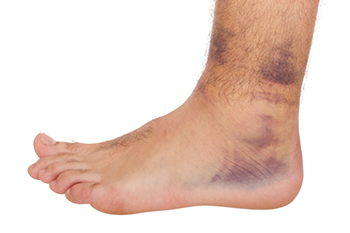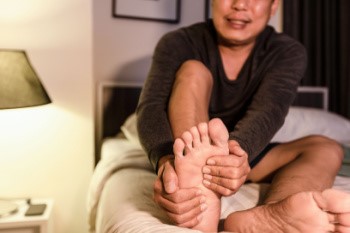 Ankle sprains, while commonly known for affecting ligaments, can also lead to peripheral nerve damage when the injury is severe. Peripheral nerve damage can occur when the nerves around the ankle are stretched, compressed, or torn during the sprain. Symptoms of peripheral nerve damage from an ankle sprain include tingling, numbness, or a burning sensation in the foot or along the ankle. Some patients might also experience a sensation of “pins and needles.” They may also have a lowered ability to feel touch, pain, or temperature changes. Severe cases can result in a limited ability to walk due to muscle weakness. Proper diagnosis and treatment are important to manage symptoms effectively. A podiatrist, or foot doctor, can use tools like nerve conduction studies to assess the extent of nerve damage. They may suggest various treatments, including targeted stretching techniques to strengthen and restore function and medications that help manage pain and nerve symptoms. To alleviate pain and minimize the risk of chronic ankle pain, it is suggested that you consult a podiatrist for treatment options.
Ankle sprains, while commonly known for affecting ligaments, can also lead to peripheral nerve damage when the injury is severe. Peripheral nerve damage can occur when the nerves around the ankle are stretched, compressed, or torn during the sprain. Symptoms of peripheral nerve damage from an ankle sprain include tingling, numbness, or a burning sensation in the foot or along the ankle. Some patients might also experience a sensation of “pins and needles.” They may also have a lowered ability to feel touch, pain, or temperature changes. Severe cases can result in a limited ability to walk due to muscle weakness. Proper diagnosis and treatment are important to manage symptoms effectively. A podiatrist, or foot doctor, can use tools like nerve conduction studies to assess the extent of nerve damage. They may suggest various treatments, including targeted stretching techniques to strengthen and restore function and medications that help manage pain and nerve symptoms. To alleviate pain and minimize the risk of chronic ankle pain, it is suggested that you consult a podiatrist for treatment options.
Ankle sprains are common but need immediate attention. If you need your feet checked, contact Brent Harwood, DPM from Southeast Podiatry. Our doctor can provide the care you need to keep you pain-free and on your feet.
How Does an Ankle Sprain Occur?
Ankle sprains take place when the ligaments in your ankle are torn or stretched beyond their limits. There are multiple ways that the ankle can become injured, including twisting or rolling over onto your ankle, putting undue stress on it, or causing trauma to the ankle itself.
What Are the Symptoms?
Preventing a Sprain
Treatment of a Sprain
Treatment of a sprain depends on the severity. Many times, people are told to rest and remain off their feet completely, while others are given an air cast. If the sprain is very severe, surgery may be required.
If you have suffered an ankle sprain previously, you may want to consider additional support such as a brace and regular exercises to strengthen the ankle.
If you have any questions please feel free to contact one of our offices located in Fairhope, Brewton, and Atmore, AL . We offer the newest diagnostic and treatment technologies for all your foot and ankle needs.
 Peripheral neuropathy, a complication of diabetes, occurs when high levels of fats or sugar in the blood damage nerves throughout the body, particularly in the extremities like the feet and hands. Symptoms include numbness, tingling, pain, and loss of sensation in these areas. Peripheral neuropathy often progresses gradually and can be unnoticed until its more advanced stages. Diagnosis involves a thorough physical examination by a podiatrist to assess reflexes, sensation loss, and skin changes. Additional tests like electromyograms, EMG, or nerve conduction velocity tests, abbreviated NCV, may be required for confirmation. While there is no cure for peripheral neuropathy, managing blood sugar levels is the best way to slow its progression. Treatment focuses on alleviating symptoms and preventing complications, such as ulcers. It is important to seek care from a podiatrist, a doctor who specializes in foot and ankle health, for comprehensive management of peripheral neuropathy. To help maintain mobility and prevent complications like ulcers and amputations, it is suggested that you include a podiatrist in your medical team.
Peripheral neuropathy, a complication of diabetes, occurs when high levels of fats or sugar in the blood damage nerves throughout the body, particularly in the extremities like the feet and hands. Symptoms include numbness, tingling, pain, and loss of sensation in these areas. Peripheral neuropathy often progresses gradually and can be unnoticed until its more advanced stages. Diagnosis involves a thorough physical examination by a podiatrist to assess reflexes, sensation loss, and skin changes. Additional tests like electromyograms, EMG, or nerve conduction velocity tests, abbreviated NCV, may be required for confirmation. While there is no cure for peripheral neuropathy, managing blood sugar levels is the best way to slow its progression. Treatment focuses on alleviating symptoms and preventing complications, such as ulcers. It is important to seek care from a podiatrist, a doctor who specializes in foot and ankle health, for comprehensive management of peripheral neuropathy. To help maintain mobility and prevent complications like ulcers and amputations, it is suggested that you include a podiatrist in your medical team.
Neuropathy
Neuropathy can be a potentially serious condition, especially if it is left undiagnosed. If you have any concerns that you may be experiencing nerve loss in your feet, consult with Brent Harwood, DPM from Southeast Podiatry. Our doctor will assess your condition and provide you with quality foot and ankle treatment for neuropathy.
What Is Neuropathy?
Neuropathy is a condition that leads to damage to the nerves in the body. Peripheral neuropathy, or neuropathy that affects your peripheral nervous system, usually occurs in the feet. Neuropathy can be triggered by a number of different causes. Such causes include diabetes, infections, cancers, disorders, and toxic substances.
Symptoms of Neuropathy Include:
Those with diabetes are at serious risk due to being unable to feel an ulcer on their feet. Diabetics usually also suffer from poor blood circulation. This can lead to the wound not healing, infections occurring, and the limb may have to be amputated.
Treatment
To treat neuropathy in the foot, podiatrists will first diagnose the cause of the neuropathy. Figuring out the underlying cause of the neuropathy will allow the podiatrist to prescribe the best treatment, whether it be caused by diabetes, toxic substance exposure, infection, etc. If the nerve has not died, then it’s possible that sensation may be able to return to the foot.
Pain medication may be issued for pain. Electrical nerve stimulation can be used to stimulate nerves. If the neuropathy is caused from pressure on the nerves, then surgery may be necessary.
If you have any questions please feel free to contact our offices located in Fairhope, Brewton, and Atmore, AL. We offer the newest diagnostic and treatment technologies for all your podiatric needs.
 Heel spur surgery stands as a significant decision for those grappling with persistent heel pain. Understanding the procedure's intricacies unveils vital insights. The surgery involves excising the bony protrusion from the heel bone, often performed under local or general anesthesia. It typically necessitates a recovery period, during which mobility may be limited, demanding patience and adherence to post-operative instructions. Complications such as infection or nerve damage, though rare, underscore the importance of meticulous post-operative care. The decision to undergo surgery hinges on various factors, including the severity of symptoms and the efficacy of non-surgical interventions. Consulting with a podiatrist is essential for informed decision-making, as they can provide tailored guidance based on individual circumstances. While heel spur surgery offers relief for many, it is important to approach it with a thorough understanding of the process, potential outcomes, and commitment to recovery. If you have a heel spur that is causing pain, it is strongly suggested that you confer with a podiatrist who can determine if heel spur surgery is right for you.
Heel spur surgery stands as a significant decision for those grappling with persistent heel pain. Understanding the procedure's intricacies unveils vital insights. The surgery involves excising the bony protrusion from the heel bone, often performed under local or general anesthesia. It typically necessitates a recovery period, during which mobility may be limited, demanding patience and adherence to post-operative instructions. Complications such as infection or nerve damage, though rare, underscore the importance of meticulous post-operative care. The decision to undergo surgery hinges on various factors, including the severity of symptoms and the efficacy of non-surgical interventions. Consulting with a podiatrist is essential for informed decision-making, as they can provide tailored guidance based on individual circumstances. While heel spur surgery offers relief for many, it is important to approach it with a thorough understanding of the process, potential outcomes, and commitment to recovery. If you have a heel spur that is causing pain, it is strongly suggested that you confer with a podiatrist who can determine if heel spur surgery is right for you.
Foot surgery is sometimes necessary to treat a foot ailment. To learn more, contact Brent Harwood, DPM from Southeast Podiatry. Our doctor will assist you with all of your foot and ankle needs.
When Is Surgery Necessary?
Foot and ankle surgery is generally reserved for cases in which less invasive, conservative procedures have failed to alleviate the problem. Some of the cases in which surgery may be necessary include:
What Types of Surgery Are There?
The type of surgery you receive will depend on the nature of the problem you have. Some of the possible surgeries include:
Benefits of Surgery
Although surgery is usually a last resort, it can provide more complete pain relief compared to non-surgical methods and may allow you to finally resume full activity.
Surgical techniques have also become increasingly sophisticated. Techniques like endoscopic surgery allow for smaller incisions and faster recovery times.
If you have any questions please feel free to contact our offices located in Fairhope, Brewton, and Atmore, AL. We offer the newest diagnostic and treatment technologies for all your podiatric needs.